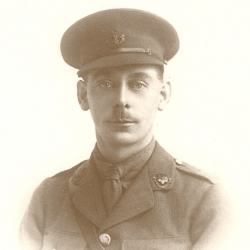Sidney William Ruttenau was born on September 22, 1882 in Chorlton. His father, William Ruttenau, owned W. Ruttenau & Co, a leather merchant and manufacturer at the Good Hope Mill in Ashton-under-Lyne. In 1901 he was living with his mother, Helen Ruttenau, father and sister, Amy Helene, and three servants in Withington. He was educated at Sedbergh School, Cumbria and later joined the Manchester University Officer Training Corps as a cadet. The business flourished and by 1911 Sidney had joined his father as a partner in the family business and lived with his parents and five servants in a large house in Fallowfield.
Shortly after the outbreak of war he was appointed as a Second Lieutenant in the 9th Battalion Manchester Regiment (Territorial Force), along with 10 others, on October 12, 1914. He joined the 2/9th in training at Southport before moving with them to Haywards Heath and Pease Pottage. 2/Lt. Sydney William Ruttenau was one of the 5 Officers (and 222 men) who traveled to Gallipoli in July 1915, joining the Battalion at Cape Helles on July 23rd.
Assigned as a platoon commander in C Company, he fought in the Battle of Krithia Vineyard and emerged unscathed despite being grazed by bullets twice. Already unwell, on August 12th he was sent sick to hospital in Alexandria with Dysentery and around 45 days later was medically evacuated to the UK arriving at Devonport on October 15th on the Andania. He recovered quickly and joined the 3rd Reserve Battalion Manchester Regiment at Codford on December 21, 1915. He sailed for Egypt in February, 1916 rejoining the 9th Battalion in March 1916 and on June 1st was promoted to Lieutenant.
He sailed with the Battalion to France, arriving March 11, 1917 and on March 27 attended a 5-day course of instruction. He left for leave in the UK on April 19th returning 13 days later. On May 24 he left to attend a two week school of instruction on Lewis Guns at Etaples and on July 29 left to attend a Musketry course. He enjoyed another two weeks of home leave in January 1918 and upon his return immediately attended another course of instruction. He was posted to the 1/5th Battalion Manchester Regiment on February 16, 1918 and was struck off the strength of the 9th Battalion.
He remained in the service and was demobilised on January 27, 1919 retaining the rank of Lieutenant. In October 1919 he changed his name by deed poll to Sidney William Radnor. And in on February 4, 1921 became a Lieutenant in the Territorial Reserve subsequently relinquishing his commission on September 30, 1921. In January 1924 he dissolved W. Ruttenau & Co with his father and an outside partner, perhaps due to the ill health of his father who died the following year. He continued to work as a leather manufacturer and traveled extensively for business.
Lt. Sidney William Radnor died in Didsbury on November 13, 1949. He was 67 years old.

